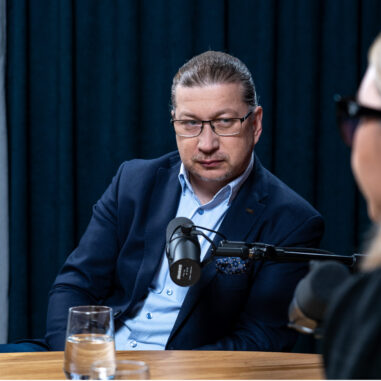
You are not alone! A common way through cancer thanks to foundations like OnkoCafe. Episode 40
Have you ever wondered what an important role patient organisations play in the healthcare system?
In the latest episode of , Po pierwsze Pacjent, Monika Rachtan talks to Anna Kupiecka, president of the OnkoCafe - Together Better Foundation, about the role patient organisations play in improving the quality of life of people facing cancer. The conversation sheds light on how the oncology side of healthcare in Poland has changed in recent years, what changes are still needed and why it is important for people to take advantage of screening. The discussion also highlights the importance of support at every stage of the disease, not only on the medical side but also on the emotional side, and how foundations such as OnkoCafe help to fill gaps in the healthcare system by offering patients and their families the support they need.
The beginnings of OnkoCafe
Anna Kupiecka, president of the OnkoCafe - Together Better Foundation, is a living example of how the personal experience of dealing with cancer can be transformed into a mission to help others. The breast cancer diagnosis she heard in 2010 not only presented her with a life challenge, but also inspired her to take action. Initially, looking for support and information, she set up a support group, 'Fakraczki', on Facebook. In this virtual place, women affected by cancer could share their experiences gained during the treatment process. The common struggle, mutual support and understanding they found there became the foundation for Ms Anna's further activities.
In 2014, in a bid to broaden the scope of assistance and take her support activities to a wider level, Anna Kupiecka decided to formally establish the OnkoCafe Foundation - Together Better. The foundation quickly became a place where people struggling with cancer and their loved ones can find not only emotional support, but also access to sound knowledge and expert advice.
Since its inception, the foundation's mission has been to provide comprehensive support to people facing cancer and their families. OnkoCafe's activities are based on the belief that emotional support, access to sound medical knowledge and the opportunity to exchange experiences with other patients are an integral part of the treatment and recovery process.
Over the years, the OnkoCafe - Together Better Foundation, thanks to the steadfast determination of its founder and the support of numerous volunteers, specialists and donors, has developed a wide range of activities. From organising meetings and workshops, to running a Patient's Club, to individual consultations with experts.
Comprehensive mission of the OnkoCafe Foundation
Since its inception, the OnkoCafe - Together Better Foundation has aimed not only to fight cancer, but above all to support people struggling with the disease at every stage of its course. The foundation's mission goes beyond the traditional notion of treatment, encompassing a holistic approach to the patient that emphasises the equally important psychological, social and educational aspects.
Central to OnkoCafe's activities is the OnkoCafe Patient's Club, a place where patients and their loved ones can find space for themselves - both to exchange experiences and to participate in educational activities, workshops or consultations with experts. The Foundation is aware that cancer is a challenge not only for the body, but also for the spirit, and therefore relies on comprehensive support to help patients regain their life balance and strength to fight the disease.
Individual consultations with experts, including psycho-oncologists, dieticians or oncologists, are another pillar of the foundation's work. Access to specialist knowledge and advice at any stage of the disease is invaluable, and the possibility of taking advantage of free consultations online, over the phone or in person opens up new possibilities for patients in terms of treatment and taking care of their own health.
Public education and raising awareness of cancer prevention are other important tasks that the foundation aims to achieve. By organising educational campaigns, workshops and training, OnkoCafe aims to reduce the incidence of disease and promote a healthy lifestyle. At the same time, representing the interests of oncology patients, the foundation actively participates in the dialogue on the improvement of the healthcare system in Poland, striving for better accessibility to modern treatment methods.
The foundation's headquarters on Madalińskiego Street in Warsaw is an open space where anyone in need can come - whether for advice or emotional support. This accessibility and readiness to help on site underline the unique character of OnkoCafe as an organisation that always puts the patient first.
Development of oncology care in Poland over the years
The transformation of oncology care in Poland in recent years demonstrates significant advances in the field of oncology, both in terms of access to treatment and psychological support for patients. Anna Kupiecka sheds light on the evolution of a health system that is increasingly beginning to appreciate and integrate psychological aspects in cancer treatment.
"Over the last decade we have seen a breakthrough in the approach to oncology treatment in Poland. Oncology unities, the introduction of the oncology package and the role of care coordinators are just some of the initiatives that are changing the face of Polish oncology," - says Anna Kupiecka. The episode's guest emphasises that these changes not only make it easier for patients to navigate the complex healthcare system, but also increase the efficiency of treatment through more personalised therapeutic pathways. What's more, the evolution of these processes enables patients to access modern therapies more quickly.
However, one of the most significant changes is the increase in public awareness and acceptance of psychological support. Kupiecka points to the huge progress in patients' perception of psycho-oncology. In the past, professionals had to convince patients to see a psychologist; now it is the patients who actively seek support, reflecting a change in mentality and a growing awareness of the importance of holistic care in the treatment process.
Patient organisations have played an equally important role in the development of oncology in Poland. Working on behalf of patients, not only through direct support and education, but also by working towards better systemic solutions, is invaluable. Patients' foundations and associations not only provide a platform for support and exchange of experience for those affected by the disease, but also work to increase the availability and quality of treatment. Thanks to their activities, oncology patients are not left on their own, but receive comprehensive assistance from the moment of diagnosis, through the entire treatment process, to post-treatment support.
Their work fills gaps in the healthcare system, providing patients with access to the latest medical knowledge, psychological support and assistance in navigating the complex healthcare system. Patient organisations play a key role in the humanisation of medicine, emphasising that cancer treatment is not just medical therapy, but also about caring for people in their holistic dimension.
Further improvements in oncology care
Anna Kupiecka, in the context of the rapidly developing oncological care in Poland, highlights the need to further improve the health system for people facing cancer. A key area that needs to be intensified is improving the coordination and accessibility of care. Implementing an integrated approach with the active participation of care coordinators can significantly support patients during the complex treatment process, minimising stress and uncertainty.
"A significant step towards improving care is also to expand the competence of primary care physicians in the area of oncology. There is a need to increase their role in early cancer detection, diagnosis and initial patient care. Such a change would not only speed up the treatment process, but also reduce the burden on cancer centres. Furthermore, it would facilitate access to specialised care for patients at a more advanced stage of the disease, improving the overall quality and efficiency of the health system," comments Anna Kupiecka.
The guest of the episode also highlights the importance of psycho-oncological support and health education as key elements of oncology care. Integrating psychological support with the therapeutic plan and raising awareness of prevention can significantly improve the quality of life of patients and their loved ones. In addition, rapid access to modern therapies and improved early diagnosis are essential elements in increasing the chances of a cure. All these measures, combined with good reimbursement trends, aim not only to improve care for existing patients, but also to fight cancer more effectively at all stages - from prevention to treatment.
The Patient First programme is available on multiple platforms, including Spotify, Apple Podcasts and Google Podcasts.
Transcription
Monika Rachtan
Hi, a very warm welcome to another episode of the programme "Patient First". Last time, when Igor Grzesiak was our guest, we talked about patient organisations, presenting only the theory of how they work. Today, I have invited a representative of these organisations to show, by way of example, the benefits of their activities. My, and above all your guest, is Ania Kupiecka, President of the OnkoCafe Foundation - Together Better. Hi Ania, a warm welcome to you.
Ania Kupiecka
Hello, good morning, and a warm welcome.
Monika Rachtan
Anna, going back to Igor's words, who mentioned the diversity of patient organisations, from small ones to those running big campaigns, tell us about your mission. When you think about actions, do you focus on the general, or is the individual patient important to you?
Ania Kupiecka
In every campaign, regardless of its size, the patient takes centre stage. These actions reach individuals, sometimes changing their lives. That's why I don't differentiate between big or small actions - they all create an end result that brings help that is appropriate for everyone. Whether the action comes from a small association or a large organisation, what matters is how much help we can give to an individual and how these effects multiply.
Monika Rachtan
My slogan is "Patient First". - patient-centred, patient-centred healthcare system. How do you assess our healthcare system in terms of patient-centredness?
Ania Kupiecka
Unfortunately, our system is not yet fully geared to each patient's needs, mainly due to limited resources. Our foundation maintains direct contact with patients, which allows us to see that individual care is often insufficient. Although initiatives such as the National Cancer Network can bring improvements, we lack staff and funding. Patient organisations, working from the smallest to the largest, are partly filling this gap, but there is still much to be done.
Monika Rachtan
I was reminded of when I visited your foundation and saw how you respond directly to patients' needs. Do you often come across people's real, unplanned stories?
Ania Kupiecka
Yes, we often see random people who come to us looking for help. Since we have a premises accessible from the street, more and more patients visit us spontaneously. This shows how important it is for patient organisations to be accessible and open. Such meetings are very valuable and motivating for us.
Monika Rachtan
Can you provide the address of your headquarters so that anyone who needs help can contact you?
Ania Kupiecka
Our headquarters are located at 50/52 Madalińskiego Street, premises u30, opposite the Żabka shop, in Warsaw. We welcome anyone who needs support. Our presence and accessibility is the key to real help and support for those in need.
Monika Rachtan
Thank you very much on behalf of the patients for this declaration of willingness to help, because in difficult times it is important to know that there is someone who really wants to help. And what was your most difficult moment in life? You talked about a breakdown, a diagnosis, a crisis.
Ania Kupiecka
My most difficult moment was around the third-fourth chemotherapy. My body was already very damaged, among other things by the two quick operations required due to the aggressive cancer. I was very weakened at that time. The diagnosis of breast cancer at the age of 43 completely changed my life. The chemotherapies weakened me strongly, also mentally. A breakdown came, I wanted to give up treatment, I thought I was going to die anyway. Help came from other patients, including a nun I met at rehabilitation. She declared that she would be with me until the end of my treatment. It was the support I received from her and other women that motivated us to set up the foundation.
Monika Rachtan
This is an inspiring story. Patients often complain about a lack of information and support. In retrospect, do you notice that the healthcare system and the approach to the patient has changed?
Ania Kupiecka
Yes, I see a huge change. The organisation of treatment has improved, Unity and the oncology package have been created, coordinators have been introduced. Treatment pathways have also changed, for example in breast cancer. Psycho-oncology guidelines have been introduced, which has greatly improved access to psychological support. Importantly, the attitude of patients and their families towards using a psycho-oncologist has changed, and this is now more common. A few years ago, patients had to be persuaded to use such help, which was a challenge. Now, however, we see a lot of interest and even queues for psychologists and psycho-oncologists at our foundation.
Monika Rachtan
You draw attention to the importance of the help you offer, using your experience and knowledge of the system. You can support, advise on what to do to get a better treatment option. Your years of working with patients allow you to act like a practising psycho-oncologist.
Ania Kupiecka
I definitely act as an organiser, support, counsellor and educator. Although psycho-oncology is a serious field, we have been working with psychologists and psycho-oncologists since the beginning of our foundation. From as early as our second year, I invited the outstanding psycho-oncologist Adrianna Sobol to work with us. Together we have shaped the work of the foundation, influencing the perception of psychooncology by patients, medical staff and the media. Our collaboration with SWPS and the internships for future psychooncologists are proof of the importance of professional care in this field. I am not a specialist in psycho-oncology, but working with experts has significantly broadened my knowledge.
Monika Rachtan
We talk about advances in oncology, which are important not only for patients but for society as a whole. But what areas still need attention to improve the situation for oncology patients?
Ania Kupiecka
The introduction of coordinated care and the extension of the competences of primary care physicians are key. Oncology should not only be available in specialist centres, so that patients are diagnosed and treated earlier already at the primary care level. In addition, patients should return to primary care after treatment, which would increase the capacity of oncology centres. Screening programmes and earlier diagnosis of cancer are also important. Despite good reimbursement trends, the problem is that patients present too late to the doctor, leading to the diagnosis of advanced cancers.
Monika Rachtan
That is, earlier diagnosis and better organisation of care are key.
Ania Kupiecka
Yes, we need to improve earlier diagnosis of cancer and increase the availability of screening programmes. Low participation in screening programmes, such as mammography, is a problem. In other countries, participation in such programmes is much higher, resulting in better cancer outcomes.
Monika Rachtan
Why do you think so many women in Poland do not take advantage of free screening, despite complaints about the healthcare system? We have the opportunity for a queue-free health check, yet only 36% eligible women choose to be screened.
Ania Kupiecka
I don't think these women are neglecting their health. The problem is a lack of trust in the healthcare system and the need to rebuild that trust to increase participation in screening programmes. Education about the importance of preventive screening and early detection of cancer is key. Although breast cancer treatment in Poland is at a high level, many women do not realise that early detection of the disease can mean a full cure or treatment that enables a better quality of life.
Monika Rachtan
How was your disease discovered?
Ania Kupiecka
My body itself let me know I was ill. I noticed a drop of blood in my bra. However, not all women experience such obvious signals. We are conducting a study to understand why women do not participate in screening. There is a lack of data explaining this situation, so it is important to take action to answer this question and propose solutions.
Monika Rachtan
Do you often come across stories of patients who neglected preventive screening and later discovered cancer?
Ania Kupiecka
Yes, we often hear difficult stories about women who, for various reasons, have not undergone tests and have been diagnosed too late. Such situations are emotionally taxing and often require psychological support. It is important to focus on treatment instead of blaming ourselves for what could have been done differently. I emphasise that it is more important to heal than to fight, as the notion of fighting can be additionally debilitating. Instead, I encourage you to be proactive and make important treatment decisions.
Monika Rachtan
I asked about the difficult stories, thinking that they might convince healthy women to get screened regularly. But can you tell a positive story of a patient who, thanks to the screening programme, detected cancer at an early stage and all ended well?
Ania Kupiecka
Of course, there are such cases. Although we more often accompany patients in more difficult situations, there are also stories that end successfully. One such story concerns a military woman who was diagnosed with cancer through screening. She was very determined and prepared for treatment, which impressed me with her attitude. Despite her initial concerns, she focused on taking action and quickly returned to work. It was a similar situation for Mrs Mary, who was also quickly diagnosed with a lump. Her initial fear and panic subsided once she became more familiar with the situation and treatment options. These stories show the importance of early cancer detection and access to reliable information.
Monika Rachtan
Do you often meet patients who admit that they neglected preventive examinations and later discovered cancer?
Ania Kupiecka
Yes, we often hear of cases where the cancer was detected late due to neglect of tests. These are difficult stories in which women blame themselves for not taking earlier action. However, rather than focusing on the past, it is important to focus on the current situation and the treatment available. Our job is to support female patients, not only through medical treatment, but also psychological support to help them cope with their current challenges.
Monika Rachtan
Was it possible to mobilise Mrs Basia, whom you mentioned, for treatment?
Ania Kupiecka
Yes, Mrs Basia is now in contact with our psychologist. After the first visits she is much calmer. The change in tone of voice and attitude from the beginning of the conversation to the end is a clear sign that our actions are having an effect. Ms Basia is now more motivated to get treatment and continue therapy, which gives us the feeling that our help is having a real impact on improving her situation.
Monika Rachtan
We have mainly talked about women, but the 'Prostate Story' campaign focuses on men suffering from prostate cancer and promotes educational activities related to prevention. Why did you decide to focus on this male subject matter?
Ania Kupiecka
The interest in the men's topic arose from our earlier campaign on breast cancer, which showed how important the role of men is in the lives of women with cancer. Men started to ask about their health problems, which prompted us to extend our activities to prostate cancer as well. We wanted to provide men with modern and smart education about this disease, as we noticed a lack of such information. The 'SimpleTaHistory' campaign started with interviews with wives of men with prostate cancer, which showed the need for more education and support for men as well.
Monika Rachtan
Are there special meetings for men within the foundation, such as support groups?
Ania Kupiecka
Yes, we organise meetings and support groups for men, which are very popular. This shows the importance of creating a space where men can talk openly about their health and illness. Our activities aim to mobilise men to take care of their health and use the help available.
Monika Rachtan
What does the humanisation of medicine mean to you?
Ania Kupiecka
For me, humanising medicine is all about disenchanting oncology, the doctor as guru and the patient as claimant. It's about bringing oncology closer to a level of normality, where doctor and patient are partners pursuing the common goal of a cure. Humanisation is also about showing that each of us can influence the improvement of medical care by building positive relationships and open communication.
Previous episodes
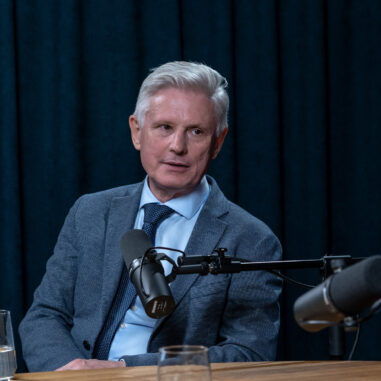
Urinary incontinence - more than a medical problem. Episode 39
Urinary incontinence, although often seen as a strictly medical problem, also has a profound social dimension
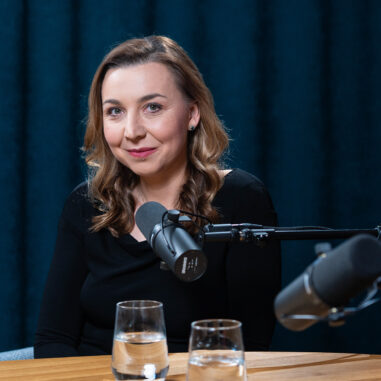
SLA - the diagnosis no one wants to hear. Episode 38
Amyotrophic lateral sclerosis (SLA), also known as Lou Gehrig's disease, is a serious and rare condition that attacks motor neurons in the brain and spinal cord
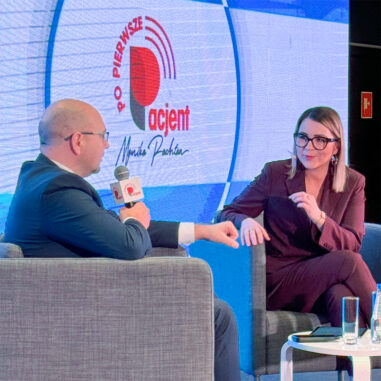
The hardest to call! How does the Patient Ombudsman help? Special episode
Demand quality. Choose facilities that focus on quality and report irregularities to the Patient Ombudsman
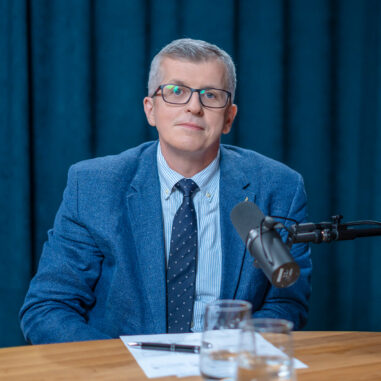
The National Oncology Network - what benefits will the patient gain? Episode 36
Oncology care in Poland plays a key role in the fight against cancer, providing the foundation for a better quality of life for patients



